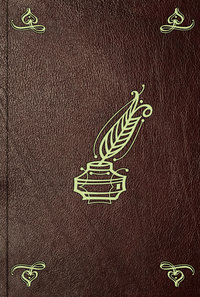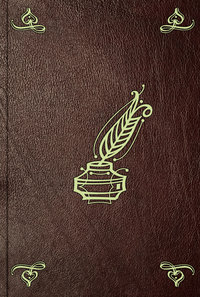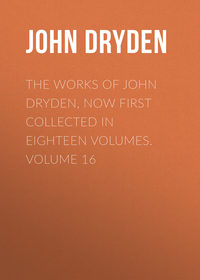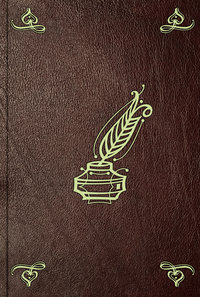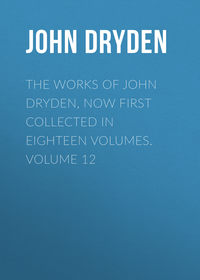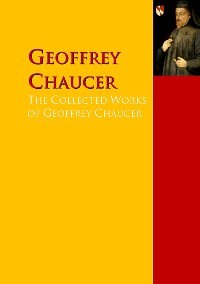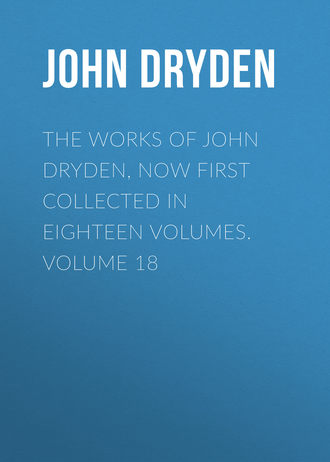 полная версия
полная версияThe Works of John Dryden, now first collected in eighteen volumes. Volume 18
67
There is no address or superscription.
68
John Dryden admitted a King’s scholar in 1682.
69
This letter from Lady Elizabeth Dryden seems to have been written at the same time, and on the same subject:
HONNORED SIR, Ascension Day, [1682.]
I hope I need use noe other argument to you in excuse of my sonn for not coming to church to Westminster then this, that he now lies at home, and thearfore cannot esilly goe soe far backwards and forwards. His father and I will take care, that he shall duely goe to church heare, both on holydayes and Sundays, till he comes to be more nearly under your care in the college. In the mean time, will you pleas to give me leave to accuse you of forgetting your prommis conserning my eldest sonn, who, as you once assured me, was to have one night in a weeke alowed him to be at home, in considirasion both of his health and cleanliness. You know, Sir, that prommises mayd to women, and espiceally mothers, will never faille to be cald upon; and thearfore I will add noe more, but that I am, at this time, your remembrancer, and allwayes, honnord Sir,
Your humble servant,
E. Dryden.
70
His eldest son Charles, as Mr Malone supposes.
71
In the hall of the college of Westminster, when the boys are at dinner, it is, ex officio, the place of the second boy, in the second election, to keep order among the two under elections; and if any word, after he has ordered silence, be spoken, except in Latin, he says to the speaker, tu es CUSTOS; and this term passes from the second speaker to the third, or more, till dinner is over. Whoever is then custos, has an imposition.
It is highly probable, (adds the very respectable gentleman, to whom I am indebted for this information,) that there had formerly been a tessera, or symbolum delivered from boy to boy, as at some French schools now, and that custos meant custos tesseræ, symboli, &c.; but at Westminster, the symbol is totally unknown at present. Malone.
72
Dr John Dolben, then Bishop of Rochester, afterwards of York. See Vol. IX. p. 303.
73
Mr Malone says, “The person meant was Robert Morgan, who was elected with Charles Dryden into the college of Westminster, in 1680, and is the only one of those then admitted, who was elected to Oxford in 1682. That circumstance, therefore, ascertains the year when this letter was written.”
74
The two last letters are printed from Mr Malone’s copy, to whom the originals were communicated by Mr John Nichols, author of the History of Leicestershire.
75
To this curious and valuable letter, Mr Malone has added the address to Rochester and the date, both of which are conjectural. Hyde, Earl of Rochester, was made first commissioner of the treasury in 1679, and continued prime minister till September 1684. Let it be remembered by those men of talents, who may be tempted to engage in the sea of politics, that Dryden thus sued for what was his unquestionable due, within two years after having written “Absalom and Achitophel,” and “The Medal,” in defence of the government, to whom he was suppliant for so small a boon.
76
Edward, Earl of Clarendon. It is uncertain in what manner our author undertook his defence.
77
The place which our author here solicits, (worth only 200l. a-year,) was the first office that Addison obtained, which he used to call “the little thing given me by Lord Halifax.” Locke also, after the Revolution, was a commissioner of appeals. Malone.
78
The “History of the League,” entered on the Stationers’ books early in 1684, and “Englished by his Majesties express command.”
79
This application was successful; and Dryden elsewhere expresses his gratitude, that his wants were attended to, and relieved during the penury of an exhausted Exchequer; Cowley’s simile, he observed, was reversed, and Gideon’s fleece was watered, while all around remained parched and arid.
80
What this circumstance was cannot now be discovered.
81
The Duchess of Ormond died July 1684.
82
The first edition of Lord Roscommon’s “Essay on Translated Verse” appeared in 1684, and a second edition was published by Jacob Tonson in 4to, early in 1685.
83
In the first edition it stood,
“That here his conqu’ring ancestors was nurs’d.”84
Latin Verses by Charles Dryden, prefixed to Lord Roscommon’s Essay.
85
Knightly Chetwood. He wrote Lord Roscommon’s life.
86
Dryden was now about to publish the second volume of the Miscellanies; in which it would appear to have been settled, that nothing should be inserted but what was new. “Religio Laici,” therefore, as having been formerly published, was laid aside for the present.
87
Probably “Albion and Albanius,” which was afterwards completed and ready to be performed in Feb. 1684-5.
88
The singing Opera was probably that of “King Arthur,” to which “Albion and Albanius” was originally designed as a prelude. But it was not acted till after the Revolution.
89
“All for Love,” and “The Conquest of Granada.”
90
His second son.
91
His eldest son.
92
The Third Miscellany was published in July 1693.
93
The author was at this time in Northamptonshire. The original has no date but August 30th; but the year is ascertained by the reference to the third Miscellany, which was published in July 1693. Malone.
94
To whom the Third Miscellany is dedicated. I fear this alludes to some disappointment in the pecuniary compliment usual on such occasions. See the Dedication, Vol. XII. p. 47.
95
This commission will probably remind the reader of the poetic diet recommended by Bayes. – “If I am to write familiar things, as sonnets to Armida, and the like, I make use of stewed prunes only; but, when I have a grand design in hand, I ever take physics, and let blood; for, when you would have pure swiftness of thought, and fiery flights of fancy, you must have a care of the pensive part. In fine, you must purge the belly.
Smith. By my troth, Sir, this is a most admirable receipt for writing.
Bayes. Aye, ’tis my secret; and, in good earnest, I think one of the best I have.” Rehearsal, act i.
This is an instance of the minute and malicious diligence, with which the most trivial habits and tastes of our author were ridiculed in the “Rehearsal.”
96
Sir Matthew, with whom Dryden appears to have resided at this time, is unknown.
97
Sir John Trenchard, who was made one of the secretaries of state March 23, 1691-2, died in office in April 1695.
98
“A short View of Tragedy,” published (as appears from the Gentleman’s Journal, by P. Motteux,) in Dec. 1692. The date in the title-page is, 1693.
99
See Vol. XII. p.45.
100
Dennis, the critic, afterwards so unfortunately distinguished by the satire of Pope. Like Rymer, and others, he retained considerable reputation for critical acumen, until he attempted to illustrate his precepts by his own compositions.
101
Sir Richard Blackmore was doomed to accomplish this prophecy. See Vol. XI. p. 236. and the Life of Dryden, p. 6.
102
In his Short View of Tragedy. See Vol. XII. pp. 45, 51.
103
This lesson was thrown away upon poor Dennis, who, by his rash and riotous attacks upon Pope, afterwards procured an immortality of a kind very different from that to which he aspired.
104
Dryden’s evil opinion of the state of matrimony, never fails to glance forth upon such occasions as the present.
105
One of the subscribers of the higher class. The decorations were probably his armorial bearings.
106
It was an ancient British custom, and prevailed in Scotland within these forty years, to finish all bargains, contracts, and even consultations, at a tavern, that the parties might not, according to the ancient Caledonian phrase, part dry-lipp’d. The custom between authors and booksellers seems to have been universal; and the reader may recollect, that the supposed poisoning of the celebrated Edmund Curl took place at a meeting of this kind.
107
At Burleigh, the seat of John, the fifth Earl of Exeter.
108
Both the gold and silver coin were at this time much depreciated; and remained in a fluctuating state till a new coinage took place.
109
From inspecting the plates of Dryden’s Virgil, it appears, that the Earl of Derby had one inscribed to him, as had Lord Chesterfield. But this wrathful letter made no farther impression on the mercantile obstinacy of Tonson; and neither the Duke of Devonshire, Lord Petre, nor Lady Macclesfield, obtained the place among the first subscribers, which Dryden so peremptorily demands for them.
110
This seems to be a bitter gibe at Jacob’s parsimony.
111
Perhaps the proposals for the second subscription. See Letter xi.
112
“The Husband his own Cuckold,” written by our author’s second son, John, and published in July 1696.
113
Tonson’s answer to the foregoing letter, seems to have been pacific and apologetical, yet peremptory as to his terms.
114
Richard Bentley, a bookseller and printer, who lived in Russel Street, Covent Garden.
115
A banker or goldsmith, afterwards notorious for his share in the South Sea scheme, to which Company he was cashier.
116
Sir Robert Howard had been appointed auditor of the Exchequer in 1673, and held that office till his death.
117
The celebrated watchmaker, who was originally a jacksmith. Malone.
118
They were at this time at Rome.
119
The Eclogues of Virgil had been published in the first Miscellany. Dryden probably corrected them with a pen in Lady Elizabeth’s copy of the printed book, and sent it to the bookseller, as what is technically called copy.
120
This person, in the last age, was frequently called “the learned tradesman.” “Sir Andrew Fountaine (says Swift, in his Journal, October 6, 1710,) came this morning, and caught me writing in bed. I went into the city with him, and we dined at the Chop-house, with Will Pate, the learned woollen-draper; then we sauntered at china shops and booksellers; went to the tavern, and drank two pints of white wine,” &c. Mr William Pate was educated at Trinity Hall in Cambridge, where he took the degree of B.C.L. He died in 1746, and was buried at Lee, in Kent.
Mr Malone, who mentions these particulars, transcribes Mr Pate’s epitaph, the moral of which is: —
Nervos atque artus esse sapientiœ,Non Temere Credere.It would seem, from Dryden’s letter, that this learned tradesman understood the mercantile, as well as the literary use of the apothegm.
121
A Roman Catholic.
122
At Denham Court, in Buckinghamshire. Sir William Bowyer married a kinswoman of Lady Elizabeth Dryden; Frances, daughter of Charles, Lord Cranbourne, eldest son of William, the second Earl of Salisbury. Malone.
123
This seems to imply a suspicion, though an odd one, that Jacob, being bent to convert Dryden to his own views of politics, intercepted his sons’ letters from Rome, as proceeding from an interest hostile to his views. (See p. 140.) His earnest wish was, that the Æneid should be inscribed to King William.
124
The translation of Virgil.
125
In MS. Harl. p. 35, in the Museum, are the following verses, occasioned by this circumstance:
“To be published in the next edition of Dryden’s Virgil.
“Old Jacob, by deep judgment swayed,To please the wise beholders,Has placed old Nassau’s book-nosed headOn poor Æneas’ shoulders,“To make the parallel hold tack,Methinks there’s little lacking;One took his father pick-a-pack,And t’other sent his packing.”In a copy I have seen of this epigram, “poor” Æneas is improved into “young” Æneas.”
126
This Dryden never effected, nor was Howard’s play ever printed.
127
Probably the clergy of England.
128
This probably alludes to the proposition which appears to have been made to him, concerning the dedication of his Virgil to King William; for which a valuable pecuniary reward might have been expected. Malone.
129
The peace of Ryswick, which was proclaimed at London in the following month, October 19, 1697, O. S.
130
She means, I suppose, – by the same way her son’s letter came to her.
131
To account for the difference between the exquisite orthography of Lady Elizabeth’s present epistle, and that to Dr Busby, Mr Malone suggests, that Dryden probably revised the latter before it was sent.
132
Tom Brown had, in the year of the Revolution, published “The Reasons of Mr Bayes changing his Religion;” and in 1690, a second Part, called the “Late Converts Exposed.” What this small wit now had in hand is difficult to guess; none of his direct attacks against Dryden appear in his works: but his insignificant enmity survived Dryden, for he wrote a burlesque account of the poet’s funeral in verse, and libelled his memory in prose, in his “Letters from the Dead to the Living.”
133
This labour he never resumed.
134
The Rev. Dr Knightly Chetwood, an intimate friend of our author.
135
Mary Leigh, the wife of Sir George Chudleigh of Ashton, in the same county, Bart. She died in the year 1710. Her life is among those of Ballard’s “Learned Ladies.” The verses mentioned in the text are not prefixed to the “Virgil,” but printed in Lady Chudleigh’s Poems.
136
The preface to the “Pastorals.”
137
The “Ode for St Cecilia’s Day.” It is pleasing to be assured, that the best of English lyrics was received with due honour on its first appearance.
138
Our author only translated the First Book. See Vol. XII. p. 231.
139
His son Charles had probably been much hurt by a dangerous fall at Rome; probably that mentioned by Mrs Thomas, in her exaggerated account of his accident at the Vatican. In a former letter, his mother enquires particularly about his head.
140
Probably the Genoese resident at that time.
141
See page 132.
142
Of Mrs Steward Mr Malone gives the following account: —
“Thislady, who was not less distinguished for her talents and accomplishments than her beauty and virtues, having been both a painter and a poetess, was the eldest surviving daughter of John Creed of Oundle, Esq (secretary to Charles II. for the affairs of Tangier,) by Elizabeth Pickering, his wife, who was the only daughter of Sir Gilbert Pickering, Baronet, our author’s cousin-german. Her eldest son, Richard Creed, as we have seen, fell in the battle of Blenheim, and was honoured with a monument in Westminster Abbey. Her eldest daughter Elizabeth, was born in the year 1672, and, in 1692, married Elmes Steward of Cotterstock, in the county of Northampton, Esq.; where they principally resided. By this gentleman, who is said to have preferred field-sports to any productions of the Muses, she had three children; Elizabeth, who became the wife of Thomas Gwillim, Esq. of Old Court, in the parish of Whitchurch, near Ross in Herefordshire; Anne, who died unmarried; and Jemima, who married Elmes Spinckes of Aldwinckle, Esq. Mrs Steward, who survived her husband above thirty years, in the latter part of her life became blind, in which melancholy state she died at the house of her son-in-law Mr Gwillim, at the age of seventy-one, Jan. 17, 1742-3; and a monument was erected to her memory in the church of Whitchurch. The hall of Cotterstock-house was painted in fresco by her, in a very masterly style, and she drew several portraits of her friends in Northamptonshire. Her own portrait, painted by herself, is in the possession of her kinswoman, Mrs Orel of Queen Anne Street.”
143
See Vol. XI. p. 71.
144
His eldest son Charles, who returned from Italy to England about the middle of the year 1698.
145
Mrs Steward’s father, Mr John Creed.
146
Miss, or, in the language of that day, Mistress Dorothy Creed, second daughter of John Creed, Esq.
147
At Tichmarsh, after his return from Cotterstock.
148
See Vol. IX. p. 23. note XVIII. Our author commemorated this circumstance in his “Elegy on the Protector:” —
149
Driden, of Chesterton, who, as appears from our author’s Epistle addressed to him, was a keen sportsman.
150
Probably Bevil Driden.
151
This severe proclamation appeared in the London Gazette, No. 3476, Monday, March 6, 1698-9. It enjoined all Popish recusants to remove to their respective places of abode; or if they had none, to the dwellings of their fathers or mothers; and not to remove five miles from thence: and it charged the lord mayor of London, and all other justices of peace, to put the statute 1st William and Mary, c.9. for amoving Papists ten miles from London and Westminster, into execution, by tendering them the declaration therein mentioned; and also another act of William and Mary, for disarming Papists.
152
Dr Thomas Tennison, who succeeded to the see of Canterbury in 1694, on the death of Tillotson. He is thus sarcastically described by William Shippen, in “Faction Displayed,” a poem written a few years afterwards:
– The isle when her protecting genius went,Upon his obsequies loud sighs conferred.“A pause ensued, till Patriarcho’s graceWas pleased to rear his huge unwieldy mass;A mass unanimated with a soul,Or else he’d ne’er be made so vile a tool:He’d ne’er his apostolic charge profane,And atheists’ and fanaticks’ cause maintain.At length, as from the hollow of an oak,The bulky Primate yawned, and silence broke:I much approve,” &c.So also Edmund Smith, in his elegant ode, Charlettus Percivallo suo;
“Scribe securus, quid agit Senatus,Quid caput stertit grave Lambethanum,Quid comes Guilford, quid habent novorumDawksque Dyerque.” – Malone.153
The London Gazette, No. 3474, Monday, Feb. 27, 1698-9, contains the order alluded to:
“His majesty has been pleased to command, that the following order should be sent to both Playhouses:
“His majesty being informed, that, notwithstanding an order made the 4th of June, 1697, by the Earl of Sunderland, then lord chamberlain of his majesty’s houshold, to prevent the profaneness and immorality of the stage, several plays have lately been acted, containing expressions contrary to religion and good manners: And whereas the master of the revels has represented, that, in contempt of the said order, the actors do often neglect to leave out such profane and indecent expressions as he has thought proper to be omitted: These are therefore to signify his majesties pleasure, that you do not hereafter presume to act any thing in any play, contrary to religion and good manners, as you shall answer it at your utmost peril. Given under my hand this 18th of February, 1698, in the eleventh year of his majesties reign.
“Pere. Bertie.“An order has been likewise sent by his majesties command, to the master of the revels, not to licence any plays containing expressions contrary to religion and good manners; and to give notice to the lord chamberlain of his majesties houshold, or, in his absence, to the vice-chamberlain, if the players presume to act any thing which he has struck out.”
154
The beautiful Fables.
155
Dorothy and Jemima Creed; the latter of whom died Feb. 23, 1705-6, and was buried at Tichmarsh.
156
The founder of the Pepysian library, Magdalen College, Cambridge. He was secretary to the Admiralty in the reign of Charles II. and James II. “He first (says Granger, Biogr. Hist. iv. 322.) reduced the affairs of the Admiralty to order and method; and that method was so just, as to have been a standing model to his successors in that important office. His ‘Memoirs’ relating to the Navy is a well written piece; and his copious collection of manuscripts, now remaining with the rest of his library at Magdalen College in Cambridge, is an invaluable treasure of naval knowledge. He was far from being a mere man of business: his conversation and address had been greatly refined by travel. He thoroughly understood and practised music; was a judge of painting, sculpture, and architecture; and had more than a superficial knowledge in history and philosophy. His fame among the Virtuosi was such, that he was thought to be a very proper person to be placed at the head of the Royal Society, of which he was some time [1685, 1686,] president. His Prints have been already mentioned. His collection of English Ballads, in five large folio volumes, begun by Mr Selden, and carried down to 1700, is one of his singular curiosities. —Ob. 26 May, 1703.”
157
To smicker, though omitted by Dr Johnson, is found, says Mr Malone, in Kersey’s Dictionary, 1708; where it is interpreted – “To look amorously, or wantonly.”
158
Christopher Codrington, governor of the Caribbee Islands.
159
Colonel John Creed, a gallant soldier. He died at Oundle, Nov. 21, 1751, aged 73, and was buried in the church of Tichmarsh.
160
The superscription of this letter is wanting; but that it was addressed to Mr Montague, is ascertained by the words – “From Mr Dryden,” being indorsed on it, in that gentleman’s handwriting. Charles Montague, (afterwards Earl of Halifax,) was at this time First Lord of the Treasury, and Chancellor of the Exchequer; the latter of which offices he had held from the year 1694. – The date is supplied by the subsequent letter. Malone.
161
The verses addressed to his kinsman, John Driden, of Chesterton, Esq. – The former poem which had been submitted to Mr Montague, was that addressed, to Mary, Duchess of Ormond. They were both inserted in the volume of Fables, which was then printing. See the next letter. – Malone.


